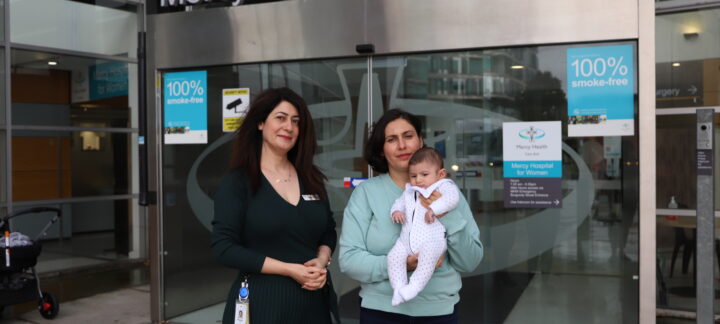Before the birth of baby Elon, Afarin’s* experiences of care at Mercy Hospital for Women (MHW) were all positive, but a series of miscommunications after her birth journey led her to speak up.
“I was pretty upset after I gave birth,” Afarin says. “There were some gaps in the information.”
As Afarin was preparing to welcome her baby, her husband Mehrzad underwent a surgical procedure, meaning he was unable to stay with Afarin in hospital and her support at home was limited.
With no other family in Australia to call on, a hospital social worker organised for Afarin to stay an additional night — but a miscommunication between staff meant she was discharged early.
“I felt that I had to follow up with the hospital about what I needed,” Afarin says. “It was my first experience having a baby. I was in pain, I was alone and I needed help.”
Afarin migrated to Australia from Iran in 2018 and says that navigating a new health system has been challenging.
“We are new migrants and we may not have a deep understanding about what is going on. We might be stressed or forgetful of information.”

Afarin with baby Elon
Mercy Health Interpreter Marjan Jowkar supported Afarin to communicate with clinicians at MHW. As a dedicated Mercy Health staff member, Marjan was also an advocate for Afarin when she chose to voice concerns about her care and helped interpret her feedback to the Mercy Health Feedback Office.
“It was reassuring that there was an interpreter to convey my message — not only my message but I spoke for other migrants as well,” Afarin says.
Marjan says Mercy Health interpreters play a powerful role in empowering patients who have difficulties speaking or understanding English to be involved and informed about their healthcare.
“We can be people’s voice,” Marjan says. “I always say to patients ‘Use your words in your language. Speak up for yourself and we will give your message to the hospital’.”

Interpreter Marjan Jowkar ensures patients receive appropriate communication about their healthcare in a way they understand
Complaints, compliments and suggestions help Mercy Health to continue improving our care and services, explains Mercy Health Feedback Officer Robyn Guy.
“It is so important that patients, carers and families provide us with feedback so that we can address the gaps in our system,” Robyn says. “We can be oblivious to problems if patients don’t inform us.”
Robyn says that when consumers provide feedback, Mercy Health will listen, ensure the feedback reaches the relevant person or area and respond, if consumers request us to do so.
“During the feedback process, we always ask consumers: ‘what is the outcome you would like?’.”
Afarin says the ability to provide feedback in her own language was a comforting experience.
“I felt that I was heard. I was really satisfied with the service. Everyone can give their feedback without fear.
“For those who have language barriers, I can reassure them that whenever you are stuck, the hospital can link you with an interpreter, and if people have to get something off their chest, they can ring the feedback office and say the things that they need to share.”
Mercy Health values feedback from those we care for. It is very important for us to understand what we do well and how we can improve.
For more information about providing feedback, visit our providing feedback webpage.
*surname withheld



